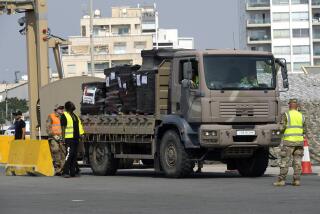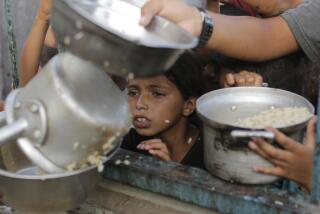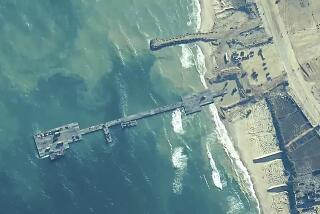Road Perils in Iraq Add to Chaos, Shortages
- Share via
BAGHDAD — At a sprawling desert camp in southern Iraq, U.S. soldiers sleep in trucks and Humvees because Iraqi merchants are afraid to deliver tents to them.
On a key road through the Sunni Triangle, masked men with Kalashnikov assault rifles occupy the concrete-block checkpoints the U.S. military once used.
And at Baghdad’s airport, goods are piling up because Iraqi truckers refuse to brave the main highway to the capital or transport the material to other U.S. bases.
In Baghdad’s central market, Iraqi shippers and merchants fret that business is drying up.
Of all the sudden changes in Iraq during the last month, control of the roads is among the most striking. The U.S.-led coalition has been unable to hold on to all of its supply and communication lines on vital routes leading from the capital. Insurgents have blown up key bridges, rocketed fuel convoys and seized hostages. Though there are no serious shortages, the perilous state of Iraq’s roads adds to a sense of chaos in much of the country.
Over the weekend, the military announced it would close two of the country’s biggest arteries to civilian traffic in an effort to get the fighting under control, cutting into Iraqi commercial life and raising fears of an economic slowdown.
“It’s a good measure of how the coalition is doing when you can get in a car and drive to the Jordanian border and down to Najaf without worrying about it,” said Charles Heyman, a senior analyst at Jane’s Consulting Group, citing two of the routes that are occasionally under insurgent control. The fact that one cannot take those roads, he said, “is not a good sign.”
American military officials acknowledge that there have been some supply shortages as a result of stepped-up insurgent activity on the routes. They are flying in more material from Kuwait and altering convoy routes and schedules. But they say there are no widespread shortages, and they vow to retake the roads.
“In some cases we have had to change the way we do business, but the bottom line is that critical supplies -- food, water, fuel, ammunition, spare parts -- are getting to the people that need them,” said Maj. Richard Spiegel of the 13th Corps Support Command, which is in charge of logistics in Iraq. “Example: Are some mess halls serving less variety of food? Yes, they are ... but there is still plenty of fresh food.”
Still, Heyman said, insurgents only need to dent the supply lines to have a serious impact on the military’s ability to maneuver.
“It looks like the opposition has gotten its act together,” he said. “It is reducing the ability of the coalition to operate where they want to.”
Since the fall of Saddam Hussein, riding Iraq’s roads has been risky business. U.S. military convoys have been targets for ambushes, and armed bandits have cruised the highways.
At many times of day and in many places, Iraq’s roads appear relatively normal. Beat-up cars and rickety trucks loaded with goods rattle across the country. Military convoys hum through unimpeded.
But for Majid Hussein Kadhum, who owns a major bus and trucking company in Baghdad, the mundane appearance belies a new volatility.
His drivers used to know which stretches of highway held which perils -- roadside bombs, twitchy American convoys and robbers.
“Now, every day things change,” Kadhum said. “You don’t know what you’ll face in the next kilometer.”
The changes began two weeks ago near the city of Fallouja. Since then, heavy fighting between insurgents and Marines have demonstrated the new and quickly shifting dynamic on Iraq’s roads.
Marines moved into Fallouja on April 5 after four U.S. civilian contractors were killed there and their bodies mutilated. They closed a section of the highway from Baghdad that runs through the city and on to the Jordanian border.
Insurgents responded by seizing a secondary route that parallels the highway.
Masked gunmen occupied former U.S. military checkpoints along the route and began roving other back roads. Several Westerners who crossed the area to or from Jordan have been detained or killed.
Most Iraqi companies that transport passengers to and from Jordan will no longer make the trip with Westerners, and are even wary about taking Iraqis.
Last week, Ayad Abdul Kareem was driving four Iraqis from Jordan to Baghdad when he stumbled onto an insurgent checkpoint. The guards demanded the passengers’ passports. When the insurgents saw they were Iraqis, they were not satisfied. The gunmen focused on a fair-haired passenger and asked him if he really was Iraqi.
The man replied that he was from a prominent tribe in the northern city of Mosul, home to many lighter-skinned Iraqis. The gunmen then quizzed him on prominent tribes in other areas before allowing the car through.
“I worry about going back there,” Abdul Kareem said.
Insurgents also staged ambushes on the main highway to Baghdad, rolling rocks across the road to set up impromptu checkpoints, and regularly attacked convoys.
On April 9, the attackers destroyed a fuel convoy and took hostage an American employee of Halliburton subsidiary KBR, formerly Kellogg, Brown & Root. KBR, which supplies coalition bases here, announced it was suspending some deliveries in Iraq. It has since announced that it has resumed shipments.
Insurgents also briefly held eight truckers from Turkey, India and Pakistan before releasing them on condition they never drive for the Americans again.
Next was the airport highway.
Baghdad’s international airport is perched on the western edge of Baghdad, near the Fallouja road. The airport road has long been the site of ambushes of U.S. convoys, but insurgents last week increased the number of assaults on trucks and convoys, and began handing out leaflets in the neighborhood warning of even more attacks.
That was enough for Qassim Kadhum. Until Saturday, the 43-year-old trucker had continued to pick up goods at the airport. But after passing several burned-out cars that day, he said he understood why crates were piling up at the terminals. Kadhum decided he would join other Iraqis who had stopped hauling supplies from the airport.
“We are worried we’ll be targets,” he said. “We are not only worried about our safety, but the future of our families.”
The insurgents also struck on a key road heading south.
That highway, from Baghdad to the Shiite part of the country, had been relatively calm. But a militia loyal to an anti-American cleric launched a series of assaults across the region two weeks ago. When 2,500 American troops swung south from Baghdad to confront the militia, it responded with ambushes that left at least one soldier dead and destroyed bridges over Iraq’s wide rivers.
The new troops arrived to Forward Operating Base Duke, an empty swath of desert outside the holy city of Najaf, to find a logistical nightmare.
Military buyers had signed contracts with local vendors to supply everything from water to portable tents. But the contractors were balking at delivering the goods.
“When the security situation gets bad, they don’t want to deliver, and that’s what’s happening now,’” said Army Capt. Ron Talarico, who is helping coordinate supplies.
A temporary water shortage was remedied, but the camp still has only six portable toilets for the 2,500 troops because the company that provides them is reluctant to travel the highway.
There are no showers or laundry facilities. A shortage of tents forces soldiers to sleep in their vehicles in 100-degree weather and blistering sandstorms.
“It’s a wasteland here,” said 1st Lt. Matt Nethers, 24, of Los Alamitos. “The Army logistical system isn’t what it could be.”
The military dispatched its Stryker Brigade, including 80 state-of-the-art combat vehicles, to try to secure the main roads and watch over KBR’s convoys. Other U.S. forces unsuccessfully tried to dislodge militia members from bridges and traffic circles in the key city of Kufa.
Finally, on Saturday, military officials announced they would close the highway running from near Najaf past Baghdad and to the city of Balad to restore order on the roads.
On Monday, they said the closures would be irregular, depending on military and repair needs.
The changes were slowly seeping into Baghdad’s commercial world Monday.
“I used to go to the south at least three times a week, but now I’m jobless because of the situation there,” said trucker Hussain Abed Ali, 32.
Sahib Ahmed Shemiryi, the owner of Al Fajeer Transportation in Baghdad’s central market, said that his clients had been beseeching him to pick up their wares, but that he dared not send his trucks.
Saad Mohammed Khalid was less worried. The 30-year-old gas station owner has a month’s worth of fuel in underground tanks, just in case tankers are blocked from the capital.
But Khalid predicted that the road disruptions would have a profound effect on a country that is increasingly disenchanted with the coalition.
“Workers cannot move from one place to another, nor can goods,” Khalid said. “This will have a big impact on Iraqis’ lives. They will get very upset, very angry.”
*
Riccardi reported from Baghdad and Sanders from near Kufa. Times staff writer Tony Perry in Fallouja, and Suheil Ahmed and Ammar Mohammed Fadhil of The Times’ Baghdad Bureau, contributed to this report.
More to Read
Sign up for Essential California
The most important California stories and recommendations in your inbox every morning.
You may occasionally receive promotional content from the Los Angeles Times.










